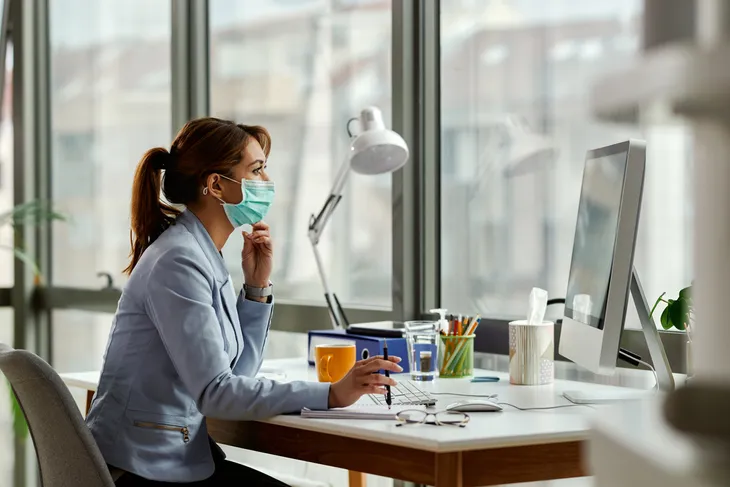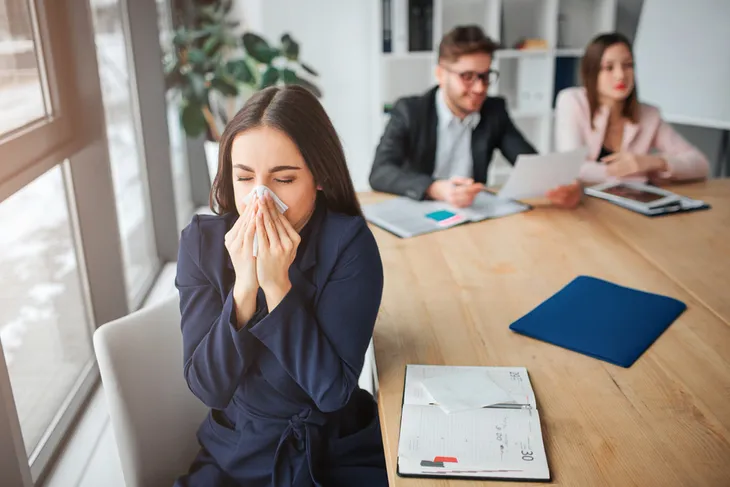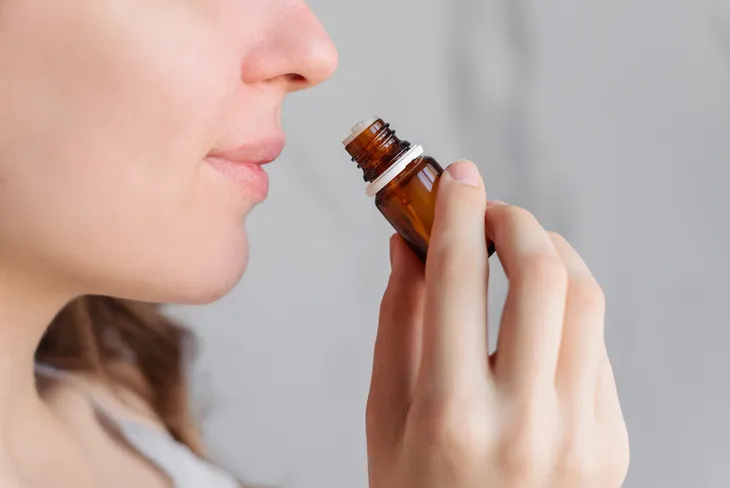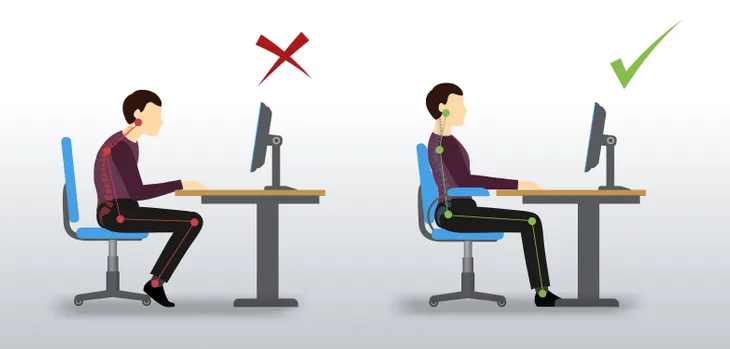Office buildings can become breeding grounds for pathogens. Poorly maintained ventilation systems and proximity to others let bacteria and viruses thrive in the indoor air. On top of all that, office spaces are somewhat of a shared living space which means there are lots of different hands touching the same surfaces.
Any surfaces that multiple people touch regularly are sure to collect bugs. To stay healthy while working in an office, here are some tips on how to avoid spreading and picking up germs at work.
Mask Up
When you’re in an enclosed area, airborne germs build up because there are few places for them to escape. Many commercial buildings contain windows that don’t open, and some warehouse-style structures lack them entirely. Standard surgical masks don’t protect you from germs, but they prevent contact with droplets and spray from others. They also keep you from spreading germs while sneezing or coughing.
For those who have a private office or desk area to work it’s not as much of a necessity, but even in those situations it’s good to have one on hand. You should consider wearing it when you leave your workspace and head into a communal area like the kitchen or bathroom.
Reduce Stress
Biochemist Hans Selye described two types of stress — eustress and distress. Healthline describes eustress as a positive form of stress that actually has a beneficial effect on health, motivation, performance, and emotional wellbeing. It’s considered a healthy stress that keeps us motivated. However distress has the opposite effect. It causes us to feel overwhelmed, inadequate, and when cortisol levels remain high, it can wreak havoc on the mind and body. Too much of this hormone can spur chronic inflammation and depression, both of which compromise the immune response.
Let’s face it, work is a common cause of stress. People who work in high stress jobs or stressful environments should learn tactics on how to manage their stress. If your work-related stress is due to taking on too much at once, consider taking a step back or delegating some of your workload to others.
Get Adequate Sleep
While you sleep, your body produces substances called cytokines, which help your immune system function correctly. If you don’t get enough rest, your levels of cytokines plummet, making you more susceptible to invading germs.
What can you do if you toss and turn all night? Try keeping electronics out of your bedroom and sipping on some herbal tea with chamomile, valerian or skullcap. You might feel tempted to hit the bottle, but doing so can interrupt sleep cycles later in the evening.
If sleep continues to prove elusive, get up and engage in quiet activities like reading so you don’t begin associating your bed with stress.
Stock Your Sanitizer
Keep a family-sized bottle of hand sanitizer on your desk and use it frequently throughout the day. If you’re prone to dry skin, add a bottle of lotion to prevent painful cracks.
While sanitizer goes a long way, it doesn’t replace the need for handwashing. Always lather up your paws after using the restroom or touching anything questionable — like a diaper, if you work in a daycare. Sing the “Happy Birthday” song twice in your head to make sure you wash long enough (20-seconds) to remove all germs. Dry them with a paper towel and use the dampened rag to open the door as you exit — in case not everyone takes hygiene as seriously.
Stay Home When You’re Sick
If you are sick with a flu-like illness, you should stay home until your fever disappears for at least 24 hours. In an ideal world, this means using your paid sick leave. Unfortunately, not every employer offers this benefit to their staff.
If harsh economic realities force you to go in, do the best you can to avoid contaminating others. While well-meaning blog writers suggest things like not accepting positions without paid leave or health coverage, we sometimes have to take on a less-than-ideal situation. Wash your hands frequently and avoid touching things that belong to other people.
Keep Your Distance
Even if you feel right as rain, you should maintain social distancing rules if you want to remain at your healthy best. Whenever possible, try to stay 6-feet or more away. If you have a compromised immune system, you can check with HR about reasonable accommodations to protect yourself. It’s wisest to put this request in writing so that there can be no he-said, she-said if questions arise.
Remain mindful of personal boundaries and avoid touching others unnecessarily. This behavior protects your health and also safeguards you from harassment claims. Save the touchy-feely stuff for after-hours. What feels like a harmless pat on the back to you could feel intrusive to another — and if they have PTSD, this behavior could trigger them. Adhere to a strict hands-off policy.
Spray Frequently Touched Items
Look around your room. You can probably name a dozen items that tons of hands touch every day. Light switches, photocopiers and fax machines all see multiple users, often several times an hour. Invest in a few bottles of disinfectant spray so you can spritz these items frequently. Don’t put the entire burden on the evening cleaning crew.
Should you wear gloves? If you do, you might risk looking like an extreme germaphobe, depending on your company culture. However, exposure to germs could mean taking several days of sick leave if you have an autoimmune condition. Don’t let your fear of appearing silly prevent you from taking the necessary steps to stay safe. You shouldn’t feel berated for exercising common sense.
Open a Window
If your building has operational versions, throw up the sash on warm, sunny days and let the fresh air stream through your workspace. Open windows improve ventilation significantly and may reduce the number of pathogens floating around in your air. Plus, you can finally eradicate the aroma of that leftover salmon Barb from accounting insisted on nuking in the breakroom.
What if a co-worker complains of allergies? If their desk is between you and the nearest window, can you ask if they will switch with you? Maybe you can compromise by opening it only a crack and adding a desk fan for added ventilation.
Add Some Plants
Way back in 1989, NASA wanted to know how they could create an artificial atmosphere on a planet like Mars. They decided to see if houseplants would banish pollutants from indoor air. These little green wonders performed better than anticipated in removing substances like formaldehyde from the surrounding atmosphere. If your building lacks windows and maybe even a view, bring nature’s healing to you.
If you don’t have a green thumb, don’t worry. Many species require little-to-no care to thrive. You can keep a succulent garden on your desk — they won’t mind if they don’t sip a single drop of water while you take your annual vacation. Other species, like golden pothos and snake plants, likewise require minimal maintenance. Ask the attendants at your nursery for easy-to-tend varieties.
Try Aromatherapy
There are several essential oils that offer benefits during cold and flu season. Research shows essential oils with cinnamon, clove, oregano, thyme and rosemary possess potent antimicrobial activity that protect against several staph bacteria strains. Some oils also protect against food-borne pathogens.
Consider having a small aromatherapy mister on your desk and add a few drops of one of the oils above. The added humidity helps keep your mucus membranes moist, which also helps them serve as the first line of defense against pathogens seeking to invade your body. You can also purchase specific scents as a roller for easy application.
Some researchers hypothesize that the scents activate regions of your brain that stimulate immune system responses.
Prep Healthy Meals
Even the most diligent person will likely encounter germs at some point during their work day. However, just because a virus enters your body doesn’t mean you’ll get sick. The job of our immune system is to fight off any potentially harmful viruses or bacteria. We need to do our part by keeping our immune system strong and healthy and one of the best ways to do that is through diet.
Create healthy habits like prepping meals in advance. This will discourage you from grabbing unhealthy meals on the go or making decisions out of hunger. You should pack a lunch ahead of time and bring snacks like granola or cut up veggies to avoid unhealthy snacking from the vending machine. Instead of focusing on counting calories, concentrate on replacing “empty” snacks with little nutritional value with healthier ones, like a handful of mixed nuts instead of chips.
Consider Supplementation
A meta-analysis published in 2017 indicates that 80- to 92-milligrams per day of zinc reduced the duration of the common cold by 33-percent. If you do feel yourself coming down with a bug, try adding some lozenges containing the mineral to your diet.
Another supplement to consider, especially if you are athletic, is vitamin C. A 2013 review of 29 randomized trials indicated that athletes who took at least 200-milligrams of this nutrient daily slashed their chances of getting a cold in half. Researchers did not find similar effects in more sedentary individuals, but they did find supplementation effective in reducing the duration of cold symptoms.
Get Ergonomic
A chair that’s too tall (or short) or misplaced monitor causes physical strain, which results in inflammation of your joints and muscles. This swelling stresses your immune system and makes you more prone to getting sick. Establishing a comfortable, ergonomic workstation isn’t a luxury — it’s a necessity if you expect to perform at your productive best.
When seated, your feet should rest flat on the floor, and your knees shouldn’t sit higher than your hips. You should be able to see your screen without leaning forward or squinting, which can cause headaches. You can also experiment with variable-height desks and inflatable exercise balls to ease back strain.
















